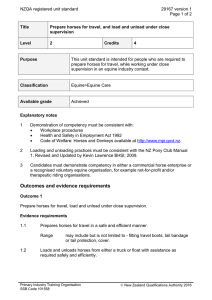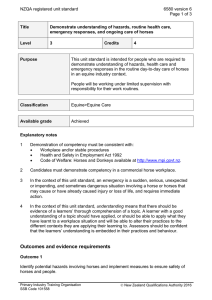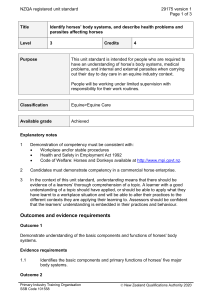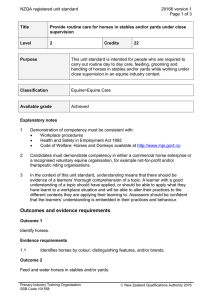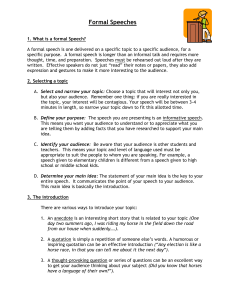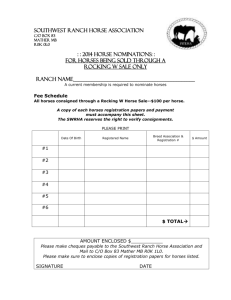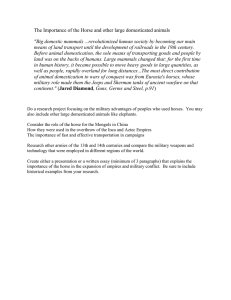NZQA registered unit standard 29168 version 1 Page 1 of 3
advertisement
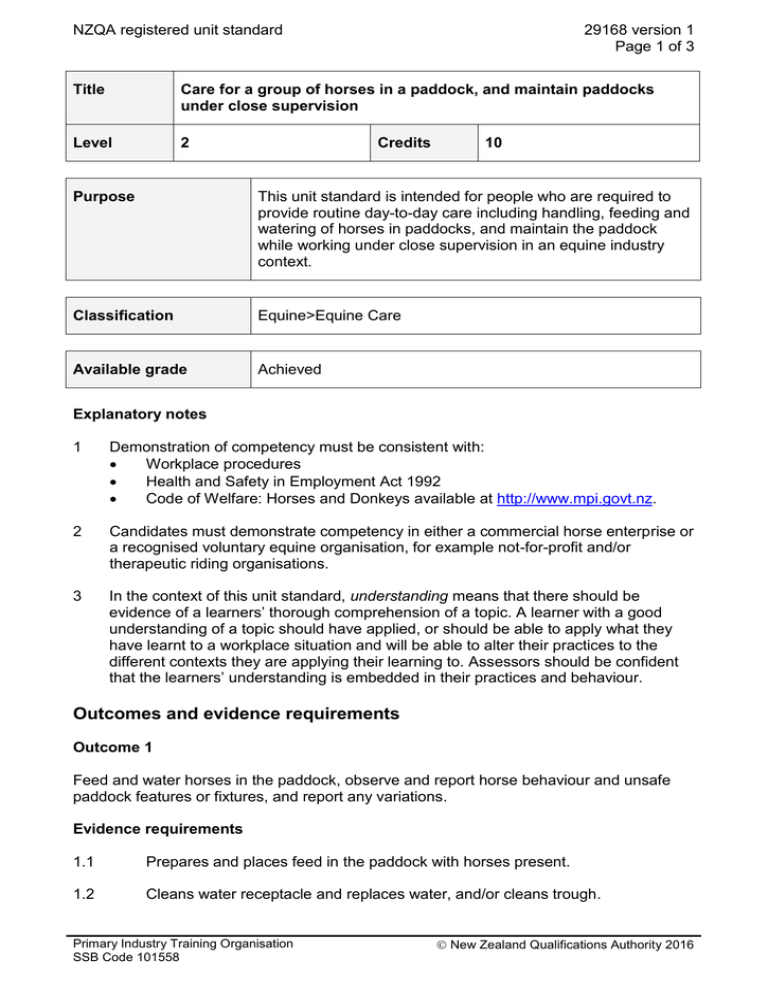
NZQA registered unit standard 29168 version 1 Page 1 of 3 Title Care for a group of horses in a paddock, and maintain paddocks under close supervision Level 2 Credits 10 Purpose This unit standard is intended for people who are required to provide routine day-to-day care including handling, feeding and watering of horses in paddocks, and maintain the paddock while working under close supervision in an equine industry context. Classification Equine>Equine Care Available grade Achieved Explanatory notes 1 Demonstration of competency must be consistent with: Workplace procedures Health and Safety in Employment Act 1992 Code of Welfare: Horses and Donkeys available at http://www.mpi.govt.nz. 2 Candidates must demonstrate competency in either a commercial horse enterprise or a recognised voluntary equine organisation, for example not-for-profit and/or therapeutic riding organisations. 3 In the context of this unit standard, understanding means that there should be evidence of a learners’ thorough comprehension of a topic. A learner with a good understanding of a topic should have applied, or should be able to apply what they have learnt to a workplace situation and will be able to alter their practices to the different contexts they are applying their learning to. Assessors should be confident that the learners’ understanding is embedded in their practices and behaviour. Outcomes and evidence requirements Outcome 1 Feed and water horses in the paddock, observe and report horse behaviour and unsafe paddock features or fixtures, and report any variations. Evidence requirements 1.1 Prepares and places feed in the paddock with horses present. 1.2 Cleans water receptacle and replaces water, and/or cleans trough. Primary Industry Training Organisation SSB Code 101558 New Zealand Qualifications Authority 2016 NZQA registered unit standard 29168 version 1 Page 2 of 3 1.3 Observes, and reports normal horse behaviour and variations, maintains records if required. 1.4 Observes and reports unsafe paddock features or fixtures. Outcome 2 Demonstrate understanding of horse’s senses, communication, body language, group hierarchy, compatible groupings, and behavioural characteristics when handling horses in group situations. Range removing a horse from the group, introducing a horse to the group, leading into and out of gates with horse present in the paddock or yard, catching one in the group, letting one go into the group. Evidence requirements 2.1 Describes the relationship between horse’s behavioural characteristics, group hierarchy, and compatible groupings of horses. 2.2 Handles horses with consideration for horse’s senses, communication, and body language. 2.3 Handles horses with consideration for horse’s behavioural characteristics. Outcome 3 Identify common pasture species, weeds, and poisonous plants commonly found in paddocks grazed by horses, and control weeds by manual methods. Evidence requirements 3.1 Identifies common pasture species found in the local area. Range 3.2 Identifies common weeds found in horse paddocks. Range 3.3 at least four. Identifies common plants that are poisonous to horses. Range 3.4 at least four. at least two. Removes weeds and plants that are potentially poisonous to horses by manual methods, or reports to the supervisor where this is not possible. Primary Industry Training Organisation SSB Code 101558 New Zealand Qualifications Authority 2016 NZQA registered unit standard 29168 version 1 Page 3 of 3 Outcome 4 Install and dismantle temporary electric fences. Evidence Requirements 4.1 Installs and dismantles temporary electric fences. 4.2 Identifies and reports faults. Planned review date 31 December 2020 Status information and last date for assessment for superseded versions Process Version Date Last Date for Assessment Registration 1 15 October 2015 N/A Consent and Moderation Requirements (CMR) reference 0018 This CMR can be accessed at http://www.nzqa.govt.nz/framework/search/index.do. Please note Providers must be granted consent to assess against standards (accredited) by NZQA, before they can report credits from assessment against unit standards or deliver courses of study leading to that assessment. Industry Training Organisations must be granted consent to assess against standards by NZQA before they can register credits from assessment against unit standards. Providers and Industry Training Organisations, which have been granted consent and which are assessing against unit standards must engage with the moderation system that applies to those standards. Requirements for consent to assess and an outline of the moderation system that applies to this standard are outlined in the Consent and Moderation Requirements (CMRs). The CMR also includes useful information about special requirements for organisations wishing to develop education and training programmes, such as minimum qualifications for tutors and assessors, and special resource requirements. Comments on this unit standard Please contact the Primary Industry Training Organisation standards@primaryito.ac.nz if you wish to suggest changes to the content of this unit standard. Primary Industry Training Organisation SSB Code 101558 New Zealand Qualifications Authority 2016

